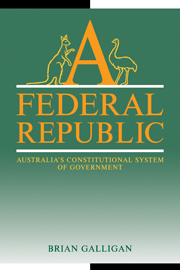Book contents
- Frontmatter
- Contents
- Tables and figures
- Preface
- Dedication
- Introduction
- 1 A federal republic
- 2 Federal theory and Australian federalism
- 3 The Senate and responsible government
- 4 Labor and the Australian Constitution
- 5 The referendum process
- 6 The protection of rights
- 7 The High Court and the Constitution
- 8 Intergovernmental relations and new federalism
- 9 Fiscal federalism
- 10 Towards and beyond 2001
- Bibliography
- Index
6 - The protection of rights
Published online by Cambridge University Press: 05 November 2011
- Frontmatter
- Contents
- Tables and figures
- Preface
- Dedication
- Introduction
- 1 A federal republic
- 2 Federal theory and Australian federalism
- 3 The Senate and responsible government
- 4 Labor and the Australian Constitution
- 5 The referendum process
- 6 The protection of rights
- 7 The High Court and the Constitution
- 8 Intergovernmental relations and new federalism
- 9 Fiscal federalism
- 10 Towards and beyond 2001
- Bibliography
- Index
Summary
As Australia approaches its constitutional centenary, there is a new urgency in informed public debate about how well human rights are protected and what additional measures ought to be adopted for better protecting rights, including, most notably, a bill of rights. Australia is inevitably caught up in the international wave of concern for enhanced protection of human rights that is producing an expanding web of influential international agreements and expectations. Comparable liberal democratic countries with which Australia is accustomed to identify itself, such as the United Kingdom, Canada, the United States and New Zealand, have all adopted bills of rights or, as in the case of the United Kingdom, become increasingly subject to European international rights jurisdiction.
Heightened concern with protecting human rights in Australia has been evident in a range of public statements and forums in recent years. In 1988 the chief justice of the High Court, Sir Anthony Mason, announced that he had changed his mind in favour of a bill of rights because Australia was going against the international trend and getting out of step with comparable countries such as Canada (Mason 1989). Again in 1988, the Constitutional Commission, after exhaustive consideration, came out in favour of a Canadian-style entrenched bill of rights for Australia and proposed that a new chapter be added to the Constitution for that purpose (Vol. 1, 1988: 435–838, 1012–21).
- Type
- Chapter
- Information
- A Federal RepublicAustralia's Constitutional System of Government, pp. 133 - 159Publisher: Cambridge University PressPrint publication year: 1995



